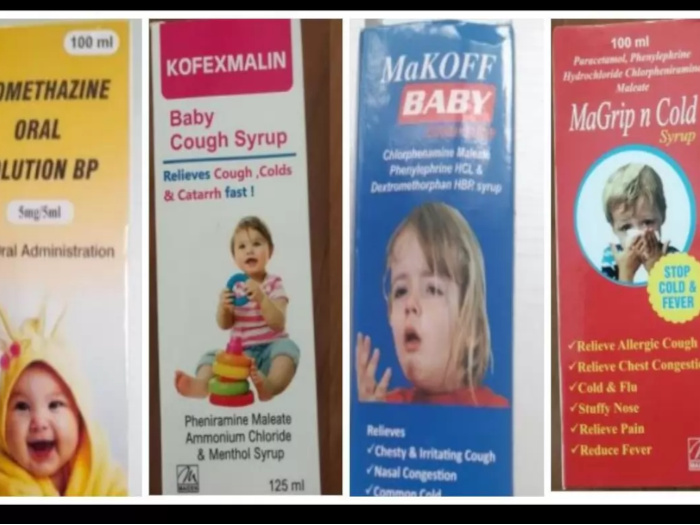Cough Syrups can be Extremely Dangerous

Manoj Pandey has created dozens of informative videos on a wide range of health issues. From time to time, we request him to write articles on selected topics for the benefit of our readers. With winter setting in, we felt this was a good moment to ask him for a piece on the efficacy of cough syrups—a subject that becomes especially relevant during the colder months.
Cough Syrups can be Extremely Dangerous
Manoj Pandey
Winter is around the corner, and with it comes a seasonal spike in sore throats and coughs—especially among children and the elderly. It is common in the northern parts of India, where pollution makes the cold air even worse for our wind pipe and lungs.
Cough syrups are the go-to medicines for sore throat and cough. They are often so soothing that, unlike tablets or capsules, we feel instantly relieved, physically as well as psychologically. Administering medicine to children is also easy when it is in the form of syrup. People tend to buy cough syrups over the counter, without a medical prescription, and use the left-over syrup for treating the next bout of cough whether to the same person or someone else in the family.
However, cough syrups sold in India are not always of the best quality and many of them do not meet the safety standards. Some of them have chemicals that can harm the body, more so if taken regularly. By quickly dulling the nerves of the sore wind pipe, they are more effective than the slowly acting, but safer, medicines. Thus, doctors tend to prescribe such syrups, and they also become patients’ favourites. In some other syrups, contamination of an industrial bye-product, diethylene glycol, is common. Similar in taste and smell to the safe chemical that is used as the sweet, soothing liquid, it comes handy for adulteration. It can cause serious side effects, and even stop the working of kidneys.
Being cheaper, this reduces the cost of production. Therefore, for the sake of a higher profit, many local firms do not hesitate to adulterate their syrups, incentivised by a weak and corruption-ridden regulatory system.
Child Deaths with Cough Syrup are not Uncommon
The immediate provocation for writing this cautionary article is two pieces of news in this very week.
It is reported that in Chindwara district of Madhya Pradesh, six children have lost their lives in the last one month following the use of a popular local brand of cough syrup. It has been found that the syrup contained diethylene glycol. As mentioned earlier, this is an industrial, harmful chemical.
It is also reported in the media that in Sikar and adjoining districts of Rajasthan, a couple of children have died after being administered a cough syrup. A large number of children are reported to be suffering its side-effects. This syrup is supposed to contain dextromethorphan hydrobromide, a strong medicine that is not tolerated well by children.
Curiously, in town, near Sikar, when a suffering child’s parent approached the doctor who had prescribed that particular cough syrup, the doctor drank the medicine to prove that it was safe. It is reported that the doctor fell unconscious after consuming the syrup, which established the toxic nature of the medicine.
You may also recall that in the past, cough syrup supplied by some Indian companies resulted in numerous child deaths in Gambia, Uzbekistan and Cameroon.
It has been reported that cough syrup samples often fail in test labs, and a number of syrups are banned and drug companies acted against every few years. Yet, the scourge continues.
Cough syrups can also contain a chemical, codeine, which gives the syrups their similar sounding names (e.g. glycodine). This highly soothing chemical causes intoxication and related side effects.
Takeaways: How to Use Cough Syrups Safely
Cough will keep troubling us every now and then, and cough syrups will remain the preferred soothing medicine for sore throat and cough, because of their many advantages over tablets and capsules. We can take the following precautions so that we benefit from them while minimizing the associated risks:
-
Taking cough syrups of only reputed, branded companies;
-
Never exceed the prescribed dose;
-
Not giving medicines suited for adults to children;
-
Not using cough syrups indiscriminately;
-
Not using left-over cough syrups, and not giving such syrups to others with similar symptoms.

Manoj Pandey is a former civil servant with a keen interest in exploring and analyzing issues related to science, technology and health. He has contributed extensively to this web magazine, particularly in the विज्ञान (Vigyan) and स्वास्थ्य (Swasthaya) categories. While he writes articles in English, he also makes Videos in Hindi showcasing his commitment to informing the common-man on these important issues. His videos can be seen on YouTube under the heading 'Hindi Health Videos' .
